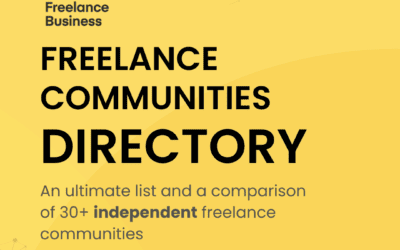Recently, we ran a poll on the Freelance Business Community LinkedIn page, asking what is the main thing stopping people from working with freelancers, and a whooping 54% pointed the finger to legal compliance and legal issues. In this article, we will highlight how to check you are being compliant when working with freelancers and that you don’t run into any legal hot water and can give you and your business the breath of fresh air you deserve.
Make sure they qualify as freelancers
In a legal sense, a freelancer is different from an employee. This may sound obvious, but the legal differences between the two can differ in some countries, so make sure you are hiring a freelancer, not an employee! This distinction will depend both on their legal structure, and on the way you manage the relationship. Are they registered as a sole trader or have a business entity? That’s important! Do they issue legal invoices? Are they happy to sign a freelance contract? Also, make sure they have the right to work in the country where they will be performing their activities.
You can see our article on the difference between different freelance definitions for more info.
Treat them as part of your team, but don’t treat them as employees
Don’t behave too strictly with the freelancer, or you might be accused of misclassification. Ask yourselves how much control do you have over the relationship? Do you micromanage their work? Do you force the freelancer to work in a certain place, during certain hours? Do you forbid them from having other clients? Do you force them to work using your own technology? In Belgium, if you exert too much control over the relationship, the freelancer can be accused of false independency and this can lead to a big fine for you!
Be aware of legislations
There are many legislations affecting freelancers. Key ones include:
- IR35 in the UK – this is a legislation introduced to combat tax avoidance for workers. It is more targeted towards intermediaries, which classify workers as self-employed, when instead they perform the duties of an employee. As we mentioned above, make sure the worker is legally classified as an employee!
- AB5 in the US – it affects freelancers in the state of California, ensuring they are indeed freelance, by confirming that: (a) the worker is free from control and direction in the performance of services; and (b) the worker is performing work outside the usual course of the business of the hiring company; and (c) the worker is customarily engaged in an independently established trade, occupation, or business. It includes a 20 point check that freelancers have to carry out.
- DBA legislation in the Netherlands – this is also aimed at combating misclassification. If the work relationship is considered to be that of an employer and employee, then you may be fined and be required to pay back taxes. Much of the steps mentioned above work for avoiding DBA.
- EU legislation – in December 2021, the EU release a proposed directive which aims to help workers on labour platforms to get the labour rights and social benefits they are legally entitled to.
Tax Compliance and VAT check
Freelancers typically should show that they have been tax compliant within the last 2+ years to ensure the end client is not at risk for tax chain liability. VAT (Value Added Tax) is a tax added to almost all goods and services in the EU, including freelance work. A freelancer is usually required to have registered for VAT. In the UK, for example, they only need to register when they hit the VAT threshold – £85,000. In Belgium, a VAT exemption scheme applies to small businesses in Belgium with an annual turnover of less than EUR 25,000. You may want to conduct a VAT check. Some freelance platforms and services can automatically check the VAT number of the client and see if it is legitimate.
Declarations
Sometimes, if you work with clients from different countries, they may need to submit declarations outlining their status. For example, if you are from the US and are hiring an international freelancer, they need to submit the IRS Form W-8BEN (for individuals) or Form-8BEN-E (for entities), which verifies their freelance status. In Belgium, similarly, you need to submit a LIMOSA declaration. Learn more in our article.
Insurance
Depending on the scope of work, organizations may require a public liability insurance from a freelancer to cover the risks. We have published a guide about freelance insurances that self-employed may want to obtain to be on the safe side. As a company, however, you may want to check what kind of specific insurance you need to protect your risks working with contractors. It varies depending on a country.
Invoices
Make sure the freelancer can supply you with a legal invoice. You can find more information on paying freelancers across borders in our article!
Credit and background checks
This is the most time-consuming route to take, but if a big project depends on the diligence of the freelancer, you may find this step will give you ultimate peace of mind. If the freelancer has had legal issues in the past, knowing this can help you be prepared for potential threats in the future. You can find local companies that can do the job for you.
For support, you can visit Charipickers or CXC Global.




